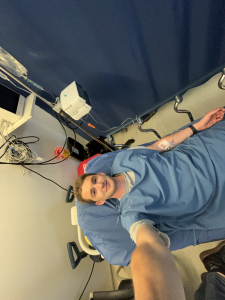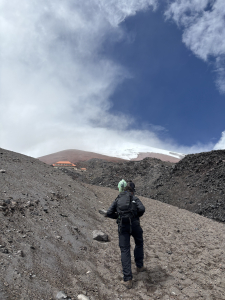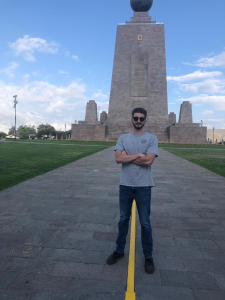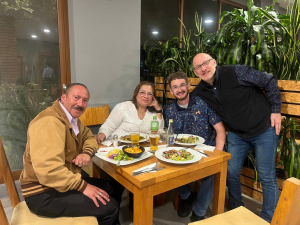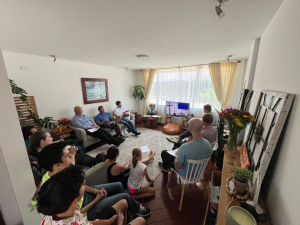Quito: The First Two Months
Hello! My name is David Fenske, and I work as a missionary assistant with Academia Cristo in Quito, Ecuador. For those who do not know, Academia Cristo is an organization supported by the WELS dedicated to sharing the gospel and training church planters throughout Latin America. Most instruction is done through applications like WhatsApp and Zoom, which aim to spread the gospel to as many people as possible.
It is challenging to know where to start when telling your story. The path to how I ended up in Ecuador is long, winding, and full of twists and turns. After some reflection, I believe the best place to start is at the end of my time studying abroad in Ireland (you may have read some of those blogs!). So here’s what’s happened since I finished my time in Ireland in April of 2024:
- I studied Spanish literature in June of 2024 in Buenos Aires, Argentina.
- I returned to New Ulm and spent July and August of 2024 working as a line cook at the New Ulm Country Club.
- In August 2024, I began studying on the Pastor track at MLC. I fell in love with the Biblical languages and, much to the chagrin of my friends, I spent most of the school year studying in the library.
- In December 2024, I was recommended to look into being a missionary assistant with Academia Cristo. I figured it would help me with my Spanish, so I applied, interviewed, and got the job.
- I finished the second semester in May 2025, and after a week at home, I returned to Buenos Aires for my third Spanish immersion trip. I had the privilege of taking an intensive Spanish literature course with Profe Bases. We read about 50 pages per day and covered various authors, genres, and themes.
- When that ended, I spent a week as a tourist in Panamá City before I went to Antigua, Guatemala, and studied a Mayan language called Tz’utujil for six weeks. I could write forever about the experience, but suffice it to say, I now have an intermediate knowledge of a language that only 72,000 people speak in five towns on the shores of Lake Atitlan.
- I was able to return home for two weeks, spend time with family, and then I flew down to Quito on September 1st.
Now that we’ve breezed through the past year and a half of my life, we can talk about how my first two months in Quito have been. I would like to say that it’s been all sunshine and daisies in my first two months, but it hasn’t.
I was welcomed and made to feel like I was a part of the missionary team from the very beginning. However, I had a severe reaction to the altitude and felt a general malaise for the first week. Then, right as I was adjusting to the altitude, I got sick again, this time with a bacterial infection of some sort. I think I got it from some spoiled ceviche– I haven’t felt so ill in years. My symptoms were so bad that I went to the hospital (see the photo below). Fortunately, I recovered within a few days and felt healthy enough to go hiking in Cotopaxi with a group of students.
Cotopaxi was unbelievable. We started our day with an hour-long hike to a base camp at around 5,000 meters (16,400ft). When we reached the base camp, I randomly made small talk with an Israeli who was very impressed when I bellowed the Shema. Unsurprisingly, he asked me how and why I knew it, which led to an opportunity to explain that I am studying to be a Lutheran pastor. Like most people, he asked, “What’s a Lutheran?” So I was able to share what I and other Lutherans confess about the gospel message, all because I had memorized Deuteronomy 6:4 in the original Hebrew. After some time at the base camp, my group and I descended, and we could ride mountain bikes most of the way down. All in all, it was an excellent day.
However, homesickness didn’t take long to hit me like a freight train. A few days after Cotopaxi, I moved from the homestay I was at to a missionary family’s home. The missionary family happened to be going home to the US for two weeks. Then they went on a work trip to Colombia, so I watched their house and dogs for three weeks. I was happy to do it, and I didn’t mind the company of the dogs, but I spent too much time in isolation, so my homesickness started to spiral. Things didn’t get any better when I moved into my own place after the three weeks had passed. It’s embarrassing to admit, but I’m not the independent, autonomous person I sometimes try to be; I need social interaction and conversation with others.
Fortunately, Profe Bases came and visited me (and some of his Ecuadorian friends). We were able to spend plenty of time together. We had long conversations, did tourist activities, and enjoyed meals together. He reminded me of why I came to Ecuador in the first place: to continue improving my Spanish. His encouragement helped me to explore the possibility of taking Spanish classes here. I’m in the registration process and hope to start taking daily classes at a Spanish institute near my home starting next week. His encouragement also helped me seek out social interaction, so I reached out to my former host Mom, and we got dinner last Friday with some other students she’s currently hosting. It was an amazing opportunity to eat with them because I was able to share the gospel with them. Believe it or not, explaining that you’re studying to be a pastor quite easily leads to conversations about God. In my experience, most people walk around with unanswered questions about God and eternity. So, when non-Christians meet a Christian, they’re eager to learn what it’s all about. This lends even more credibility to the importance of 1 Peter 3:15, “Always be prepared to give an answer to everyone who asks you to give the reason for the hope that you have.”
You may be wondering what I do with my time. My work with Academia Cristo is part-time, so I only work about 15-20 hours per week. I consider myself the “loose-ends” guy because my work varies significantly from week to week. Sure, I have some student data entry responsibilities that remain a daily task, but otherwise, I take care of odd jobs here and there. I’ve house/dogsat, cleaned the office, helped communicate with students, helped lead devotions with the missionaries, and taken notes during missionary meetings, among other things. But the 15-20 hours of work leave me quite a bit of free time, so I’ve had to be intentional about how I use my time.
I spent my first six weeks in Ecuador reviewing Greek and Hebrew grammar, and now I’ve started translating through the books of Luke and 1,2 Samuel. I’m far from an expert, but I’m amazed at how much I can understand, especially considering that I didn’t know either language until 14 months ago. If that wasn’t enough language work, I am teaching myself Latin. Latin isn’t hard, mainly because the vocabulary is very similar to Spanish and the grammatical structures are nearly identical to Greek. This means that I use five different languages almost every single day. When I’m not studying languages, I’m spending my time writing. I’m currently working on a book about biblical interpretation. Perhaps I will share more about that in the future. I would be remiss if I didn’t mention that I’ve kept up my voracious reading habits; I’ve read or finished reading 16 books in the past two months. However, when I’m not being a nerd, I work out. I lift weights two days a week and run three days a week.
Finally, my favorite time every week is when all the missionaries gather on Sunday mornings to join in worship. Because there is no church here, we gather in one of the missionary families’ homes. The services are an interesting blend of Spanglish. For example, the liturgy is usually in Spanish, the Scripture readings and sermon are in English, but the hymns/songs are a healthy balance of both. It has also been an incredible blessing to take communion with the missionaries.
It has been a pleasure to give you some insight into what has been going on in my life– thank you for reading! I ask that you pray for the gospel’s spread as Academia Cristo seeks to play its part in fulfilling the Great Commission. May God bless you!
David
An explanation of the photos:
- My first hospital visit in Ecuador
- Hiking the Cotopaxi Volcano
- Standing on the Equator
- Yo y mis viejitos
- Church with the missionaries and their families
